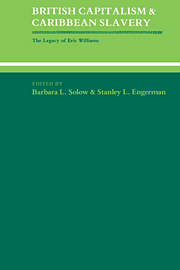Book contents
- Frontmatter
- Contents
- List of Contributors
- Preface
- British Capitalism and Caribbean Slavery: The Legacy of Eric Williams: An Introduction
- Part I Slavery as an Economic Phenomenon
- Part II Caribbean Slavery and the Industrial Revolution
- Part III The Decline of the British West Indies
- Part IV The Basis of Abolition and Emancipation
- Part V Capitalism and Slavery in Historical Perspective
Preface
Published online by Cambridge University Press: 15 December 2009
- Frontmatter
- Contents
- List of Contributors
- Preface
- British Capitalism and Caribbean Slavery: The Legacy of Eric Williams: An Introduction
- Part I Slavery as an Economic Phenomenon
- Part II Caribbean Slavery and the Industrial Revolution
- Part III The Decline of the British West Indies
- Part IV The Basis of Abolition and Emancipation
- Part V Capitalism and Slavery in Historical Perspective
Summary
Eric Williams's Capitalism and Slavery (1944) defined the study of Caribbean history, and its writing affected the course of Caribbean history. He initiated modern scholarship on the historical relation between the British West Indies and Great Britain. The themes of Capitalism and Slavery remain the themes of Caribbean history, and current controversies are being debated in the terms in which Williams posed them. Scholars may agree or disagree with his ideas, but they remain the starting point of discussion. Henry Steele Commager's verdict of 1944—that Capitalism and Slavery is “one of the most learned, most penetrating and most significant [books] that has appeared in this field of history”—is still true today.
Any conference on British capitalism and Caribbean slavery is a conference on the work of Eric Williams. This volume consists of papers originally presented at the Rockefeller Study and Conference Center at Bellagio, Italy, on May 21—25, It honors Eric Williams in the way he would have liked best: by subjecting to the best modern scholarship from America, Europe, Africa, and the Caribbean the ideas that he advanced nearly half a century ago.
We would like to thank the following participants in the conference for their valuable contributions in discussion and comment: Roy Augier, Bridget Brereton, William A. Darity, Jr., David Eltis, Alastair Hennessy, Herbert S. Klein, Patrick O'Brien, Orlando Patterson, Robert I. Rotberg, and Paul Sutton.
- Type
- Chapter
- Information
- British Capitalism and Caribbean SlaveryThe Legacy of Eric Williams, pp. ix - xPublisher: Cambridge University PressPrint publication year: 1988



